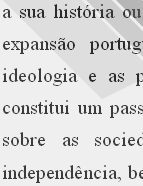

................................
Norberto Gonzaga's História de Angola [History of Angola], published in 1963 to underline the decisive role assumed by Portugal in Angolan history, identified a 'pre-colonial period' prior to the arrival of the Portuguese, emphasising the existence of the Kongo kingdom and events centred around African figures such as Queen Njinga, in order to highlight the heroism of the Portuguese, promoters of progress and change (1963, 145). The denunciations of African savagery (with recourse to cannibalism) and European aggression against Portuguese rights were at the root of the author's discourse, focusing on facts and themes revealing a Lusocentric perspective already marked by the colonial war.
The third type of historical writing sought to restore Africans to their central role in Angolan history, though often slipping on the traps resulting from a deep-seated ideology in the Portuguese cultural fabric. One of the rare representatives of this type of writing was Norton de Mattos who, acknowledging the anteriority of Angolan history, underlined the absurd discomfort this historical reality caused the Portuguese powers-that-be. Creating a kind of historiographical space where both histories were intertwined, the general referred to the Portuguese history of Angola, which had begun in 1483 in a territory where "for many centuries there had already been", "people with a social organisation that had greatly surprised the discoverers and whose history (...) must be known in order to understand the unfolding of the complex events that have taken place in that region since the end of the 15th century until today" (Mattos, Memórias e Trabalhos da minha vida, II, 1944, 27-28).
Norton de Mattos advanced with dexterity on a historical ground, flawed by ideologies and myths, to point out that the history of Angola was in fact "constituted by an analysis of the reactions and transformations that its former indigenous inhabitants (...) had experienced in their contact with us. Finally, the history of the formation of the Portuguese Angolan territory, as it exists today, depended not only on African elements that stood in the way of Portuguese expression, which were sometimes defeated, sometimes not, but also on the European nations that prevented our [that is, the Portuguese] free expansion" (II, 27-28). Characterised by great curiosity, Norton de Mattos, the non-historian who pledged his theoretical allegiance to Proudhon, was unable to reassess the organisation of Angola without resorting to the Lusocentric perspective, to the Portuguese facts and colonial problems, to define the great axes of Angolan history (II, 28-29), but he did not eliminate the Africans from the historical organisation of their country.
